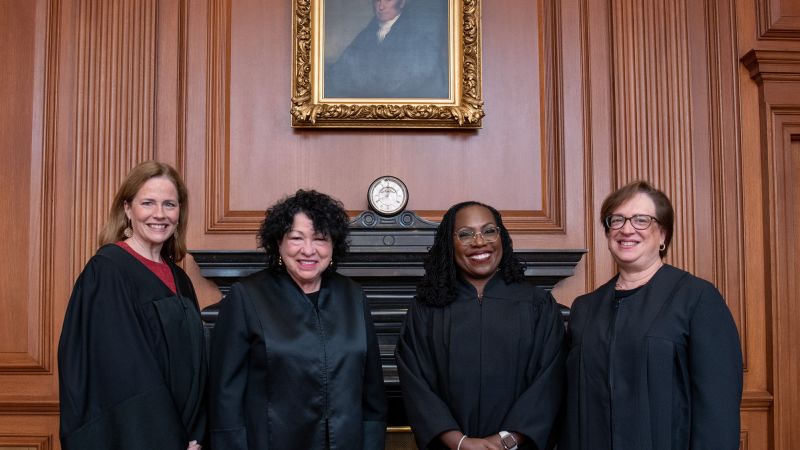CNN
—
The three liberal justices of the Supreme Court appeared to deploy a fresh strategy Tuesday as they launched a disciplined and sustained effort to attack arguments put forward by challengers to President Joe Biden’s student loan forgiveness program.
The question is whether the one-two-three punch from the liberals’ attracted conservative Justice Amy Coney Barrett and at least one more conservative justice.
First up was Justice Elena Kagan, who tackled whether the debt relief program passes legal muster. Justic Ketanji Brown Jackson focused many of her questions on a critical procedural issue that could derail the challenge. While Justice Sonia Sotomayor batted cleanup, reminding her colleagues of the consequences at stake if the program that offers relief for millions of student loan borrowers is ultimately invalidated.
The arguments, and a possible new approach, come as the left side of the bench has suffered serious losses last term in cases that broke along familiar ideological lines. It appeared the liberals had decided to follow a “divide and conquer” game plan – sometimes assigning themselves particular aspects of the dispute to try to sway their colleagues in what could be an uphill battle. It could also highlight how the liberals will move forward in other ideologically divided disputes in the near and long term.
But the looming question after some 3 and a half hours of arguments is whether the liberals are able to pick off not only one, but two votes to obtain a majority. Barrett seemed at times to attach herself to some of the arguments the liberals were making, but oral arguments can be notoriously misleading. Biden’s chances seemed slim.
Early and often, Kagan poked at Nebraska Solicitor General James Campbell who was representing the six red states challenging the plan. Central to his argument is that a plan of such political and economic consequence must have congressional authorization.
Emphasizing arguments made by Solicitor General Elizabeth Prelogar, Kagan kept returning to the Higher Education Relief Opportunities for Students Act of 2003. It’s called the HEROES Act and it was passed in the wake of the September 11, 2001, terrorist attacks. The Biden administration argues that that the secretary of education was within his authority to offer student loan relief under the law to make sure borrowers are not left worse off with respect to their loans than before the Covid emergency.
“Congress used its voice,” Kagan said.
“I mean, we worry about executive power when Congress hasn’t authorized the use of executive power,” she added. “Here, Congress has authorized the use of executive power in an emergency situation.”
Although most of the case is focused on the legality of the plan, there is an enormously important threshold issue at play that could derail the challenges and allow the plan to go into effect.
At issue is whether the challengers (the six red states and two individual borrowers) had the legal right or “standing” to be in court. It sounds like dry legalese, but it is an essential doctrine that ensures courts only hear true cases and controversies. The states have argued various claims of standing based on a legal injury of potential lost tax revenue.
At oral arguments there was a lot of discussion – prompted at first by Jackson’s questions – of a federal appeals court decision in the case that held that Missouri had the necessary standing.
The court pointed to an entity called the Missouri Higher Education Loan Authority (MOHELA). MOHELA has contracted with the federal Department of Education to service student loans. The court said that because MOHELA will stop receiving servicing fees for loans discharged under the new plan, MOHELA won’t be able to fulfill its obligation to contribute a specified amount of money to the state treasury. Critically, the appeals court said that MOHELA is akin to a state entity and therefore said it satisfied the standing argument.
Jackson’s questions about MOHELA seemed to spark an interest in Barrett. The conservative justice appeared to suggest that MOHELA is not akin to a state entity and wondered why MOHELA hadn’t filed its own claim, and why it wasn’t in court.
“Why didn’t the state just make MOHELA come then?” Barrett asked Campbell.
“If MOHELA is an arm of the state, why didn’t you just strong arm MOHELA and say you’ve got to pursue this suit” she added.
Campbell didn’t directly respond. “That’s a question of state politics,” he said.
At another point Jackson expressed some consternation that the court would make it too easy for states – with minimal injuries – to be able to come forward and challenge the policy of a president from a different party.
She stated fears about the “operation of the federal government, and its ability to govern” if states with the most “minor” interest, could successfully bring a policy to a halt.
“I feel like we really do have to be concerned about jumping into the political fray, unless we are prompted to do so by a lawsuit that is brought by someone who has an actual interest,” Jackson said.
As for Sotomayor, she stressed what is at stake from her perspective.
“There’s 50 million students who will benefit from this who today will struggle,” she said.
“Many of them don’t have assets sufficient to bail them out after the pandemic,” Sotomayor added. “The evidence is clear that many of them will have to default ”

